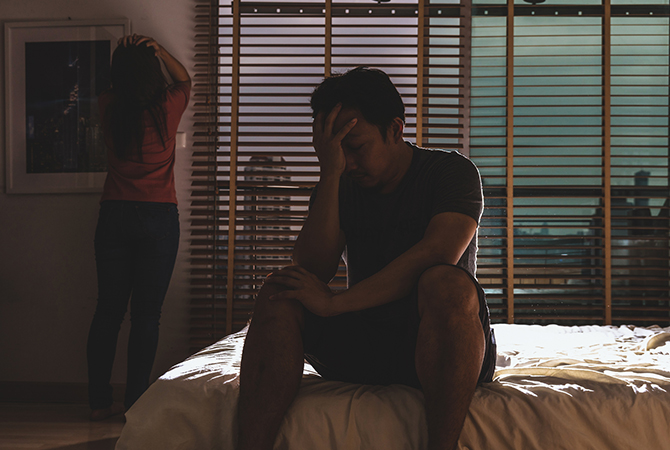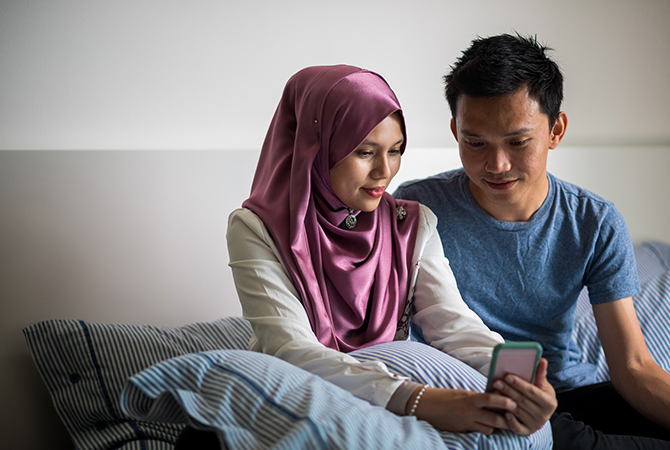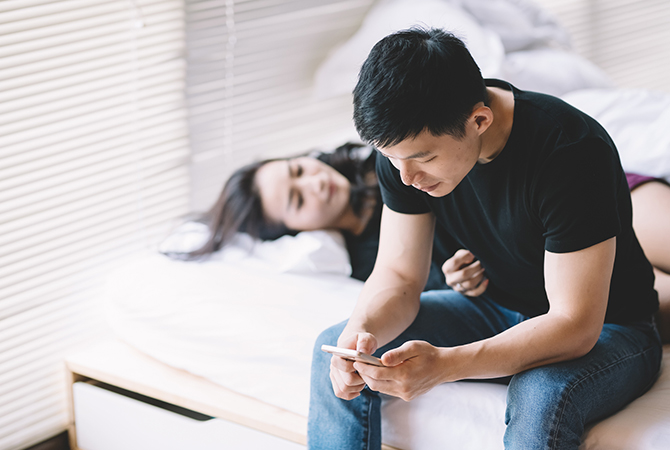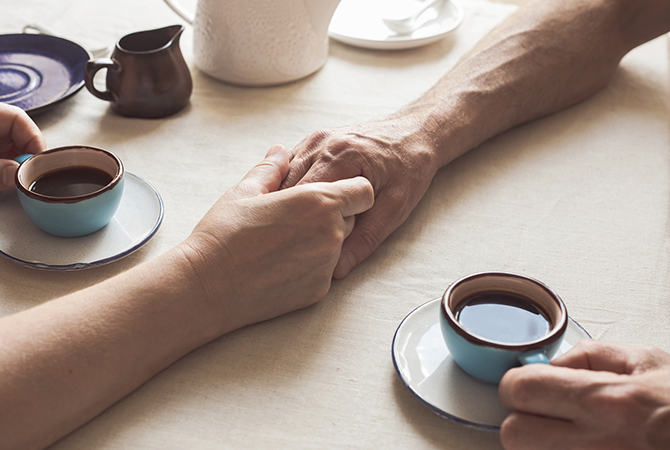Does the MCO affect you (and your partner) mentally? Here’s what you should do—according to a relationship expert

The Movement Control Order in Malaysia that is slated to last until 12 May 2020 has been useful in flattening the curve. The number of new COVID-19 cases in the country has decreased since the measure started on 18 March 2020. That’s amazing.
However, with many of us (especially couples) staying at home more than usual, psychological issues are common. Whether you’re married or co-habitating, there may be mental health problems from being confined together for a long period of time.

To delve deeper into this, we spoke to Faith Foo—the Founder and Director of Abri Integrated Mental Health—about ways to detect mental health issues and strategies to use among couples.

1. In your opinion, what are the mental consequences of couples who are stuck too long in quarantine together?
Coronavirus-related anxiety is real and can cause serious damage to any relationship. The stress that the pandemic is putting on our lives is huge. Most couples are struggling during this time because they’re stuck inside their homes, and forced to spend more time together like never before.
Some couples have gotten used to having a lot of time away from their partners each day, and were always on the go. But during long periods of quarantine together, it means sharing a confined space with their partners despite having to navigate new stressful issues such as sudden unemployment, working from home, child care, and the ambiguity surrounding the length of quarantine.
Being in an enclosed space for too long can take a toll on the mental state of couples. Short of the daily routine of leaving the house, the space can begin to feel very confined, just like being in a pressure cooker. Irritation with one another may escalate quickly. For example, I have a client who said the following: “I’ve never spent so much time with my family. I enjoy it but I am also feeling suffocated”.
2. Why do you think the lockdown/self-isolation has such massive psychological effects on couples living together?
Couples are trying to adapt to this unprecedented global crisis while working, learning, teaching, partnering, parenting, and more—on top of each other.
During the pandemic, couples face a lot more stresses such frustration from home schooling and constant childcare, the division of chores, financial tension, potential blow to one’s income, reduced funds, budgets for food, fears of contracting the illness, the need to cope with dramatic changes in personal and business-related plans, as well as lack of personal time and space.
These factors—in addition to exhaustion from parenting all day, and trying to work from home—would put couples in a bad mood. It is very easy for hard feelings and arguments to develop.
Most couple are used to leaving the house for a period of time every day to go to the gym, to work, and to meet friends. Now, it feels like there’s no privacy because we are all stuck inside.

3. How can someone identify if their loved ones or partners are suffering from psychological issues as a result of the pandemic?
Increase in behavioural changes such as: excessive crying or irritation, excessive worrying or sadness, unhealthy eating or sleeping habits, irritability, avoidance of activities enjoyed in the past, unexplained headaches or body pain, as well as use of alcohol, tobacco, or other drugs.
4. What are the biggest mistakes that couples can do to emphasise the other party’s stress and issues?
Dr. Simon Sherry, who’s a professor in the Department of Psychology and Neuroscience at Dalhousie University said that “COVID-19 can be contagious, but emotions can be contagious”. Dr. Sherry also said that: “when that perceived threat goes high, so too does anxiety. People can start to think catastrophically”.
There are reports of divorce rates skyrocketing in China since the outbreak of COVID-19 because instability and stress can exacerbate insecurities as well as increase conflict for couples.

5. What strategies do you recommend couples who need help when stuck at home together for an unusual amount of time?
First, we need to learn to take care of ourselves. Nurturing our relationship has to start with nurturing ourselves. It’s simply too much to expect partners to be the sole source of stress relief.
Some of my favourite forms of self-care include the following:
a. Allow yourself to feel your feelings. The more we allow ourselves to feel negative emotions, the quicker they resolve themselves, and the less toxic they are. Stress-regulation is our ability to identify and articulate our feelings. Give yourself permission to feel the full range of your emotions.
b. Embrace change. The only thing constant is change. We make our lives easier when we choose to embrace change instead of fighting it.
c. Meditation is one of the best methods you can use for your mental health.
d. The endorphin rush you get from exercising can be essential for stress-management, improving your mood, and even boosting your immunity.
e. Calling someone up and connecting with friends can really help too.
6. In your opinion, how important is sex when it comes to fixing relationship problems?
There’s no one-size-fits-all answer to this. Every couple is different, and what’s important for some may not be at all important for others. Sexual activity isn’t necessary for a healthy relationship. Many couples have happy, fulfilling, healthy romantic relationships without having sex with their partners—due to medical issues.
There are also many reasons why sex might be an important part for relationships. It could be an opportunity to bond with the partner and the chance to show your partner love and affection. Moreover, sex can also help you might feel more secure in your relationship. Of course, it could simply be for pleasure and fun.

7. There are a few articles that talk about anxiety and stress for couples to have sex during a pandemic and also, on the other end of the spectrum, there are couples who relieve stress through sex that could lead to a baby boom. What are your thoughts on that?
Some couples like to stay in a regular schedule of being sexual either at night or in the morning as they were already doing before the pandemic. Other couples may feel some pressure to be sexual with a higher frequency since nobody has anywhere to go.
If one partner is stressed and overwhelmed with the responsibility, it is hard for that partner to feel like engaging in sex. Couples need to talk about their feelings and try to come up with a management strategy that everybody feels good about—both with intimacy and their shared responsibilities.
8. What advice would you give to couples who are having trouble getting intimate due to stress/MCO/pandemic?
Some ideas of activities to reduce stress and tension together include: making breakfast for one another, cuddling during a movie marathon, trying laughter yoga, expressing gratitude every night, as well as talking to each other about “me” time wishes (such as duration and frequency).Many counsellors are offering online counselling sessions because of the Movement Control Order so you and your partner could take advantage of that. Counselling can be helpful for couples under normal circumstances, so it’s bound to be helpful amid a pandemic.

9. The MCO has been tough for everyone and working from home is a norm for many in Malaysia. Do you think there has been an increase in calls for divorce in the country?
I personally have two cases with one of the partners calling in for counselling. Both relationships are at the brink of divorce just before the pandemic. What I noticed was that the distance between them now isn’t helpful at all in solving their problems—since both of them have moved out just before MCO. It is more difficult to communicate when you can’t see your partner in person, especially when they don’t reply your messages.
I have a wife feeling frustrated and not cared for because the husband moved out before the pandemic—while they are in the midst of repairing their relationship. During the pandemic, the wife’s stress levels increased from taking care of their toddler. She’s frustrated and angry that the husband has it much easier than her. She felt very alone.
I can’t predict the divorce rate in Malaysia because we don’t have the statistics yet—but there are already reports of divorce rates skyrocketing in China since the outbreak of COVID-19.
10. Have you gotten a lot more calls and enquiries seeking counselling since the MCO started?
Yes and no. No, because my existing clients are used to face-to-face sessions and they still prefer that. Moreover, they have already learned some coping skills from previous sessions. They can cope with the current unprecedented anxiety.
I did notice that I have a lot more new client enquiries for phone counselling during this period. Clients’ normal stress issues suddenly feel a lot more difficult for them to handle. Cases that I’ve received include issues with insomnia, depression, relationship breakups, and home-bound stress.

11. If you can only give one answer, what’s the one tip to keeping a marriage strong—mentally, physically, and emotionally?
We are in this together; our world is in crisis. We can’t deny that this pandemic is affecting our relationships heavily in ways that most of us are not equipped to handle.
It is important to know that it’s a normal human response. While it is true that some couples discover things about each other that might be irreconcilable, most of us can avoid major conflicts with our partners and save our relationships by working to become better lovers.
12. What services do you provide at Abri Integrated Mental Health and how long have you been practising?
I have been privileged to work with a variety of clients ranging from young adults to the elderly, from diverse racial, social, and economic backgrounds, including locals and expatriates.
My work frequently leads me to clients with issues related to major life events such as marriage issues, divorce, break-ups, financial crises, health issues, quarter or mid-life crises, post-traumatic stress (PTSD), mood disorders, traumas, depression, anxiety, work-related stress, anger issues, blended family issues, grief and loss, lack of self-esteem, as well as career guidance.
I have been practising in this field for the past nine years.

13. Do you have a message of hope for Malaysians during this pandemic, especially couples that require help?
While these tips will help couples lessen conflicts in their relationships, remember to not expect perfection. Understand that these are stressful times, and you will unavoidably lose your patience and experience frustration. Compassion for yourself and your partner will go a long way as you navigate these uncharted waters together.
Understand that there is no ideal man or woman. There is no marriage made in heaven. Both partners must invest love, respect, and trust, in making the relationship work. Without this “investment”, there will not be a harmonious relationship.
My last advice for couples is: do not wait until things get worse before trying couples counselling. Many couples use counselling sessions as a way to keep their relationships healthy and to address underlying concerns that may become conflicts in the future. Receiving help early brings early relief. In fact, receiving help is a sign of courage and maturity.

Mental health is no longer a taboo subject. As mentioned by Faith Foo, always take the liberty to seek help. Talk to someone about your feelings, including your partner. The COVID-19 pandemic and MCO can be emotionally draining but psychological support is always around. This is a time for everyone to stick together.
For more information about Faith Foo and her counselling services, visit this website.
| SHARE THE STORY | |
| Explore More |



